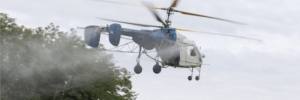Autumn aerial spraying to control grapevine golden yellows has been completed
Autumn aerial spraying against the American grapevine beetle has been successfully carried out in more than 2,000 hectares of Somogy County. The aim of the control ordered by the National Food Chain Safety Office was to reduce the spread of grapevine flavescence dorée (FD) phytoplasma, which causes grapevine golden yellows. Preventive measures remain key in controlling the disease. These include the destruction of infected vines and late-winter cuttings, spraying with approved preparations during the dormant period and planting controlled propagation material.

(Photo: Nébih)
Traditional aerial spraying by helicopter was carried out with the cooperation of specialist managers (plant doctors) and experts from government agencies. The schedule of spraying was determined by the characteristics of the growing area and the weather conditions, so the former measure planned for the most severely infected Somogy and Zala counties was finally implemented. In Somogy county, between October 9 and 14, more than 2,000 hectares of land were sprayed against the cicada that spreads the disease. The aerial control did not affect the organic/organic plantations and was carried out exclusively away from populated areas, on plantations where the harvest had already taken place. In traditional aerial spraying, the machines applied the insecticide Klartan 24 EW at a dose of 0.2-0.3 l/ha and the drop-weighting agent DropMax to reduce drift.
Preventive measures remain key in control
These include producers destroying diseased/infected plants, including late winter cuttings. The American grapevine cicada overwinters in the form of eggs in the bark cracks of second-year vine shoots, so it can also survive on shoots removed by pruning at the end of winter. It is recommended to spray against the eggs with oil-containing agents even during the dormant period. It is also important to plant healthy and controlled propagation material, because the disease can primarily spread over long distances with infected grafting. When planting, producers should only use propagation material that has been checked by the authorities and has an official label combined with a plant passport. It is worth cleaning the plantations and their surroundings from forest cicada and other wild host plants of phytoplasma, and eliminating neglected vineyard areas.
Nébih
Related news
Avian influenza has appeared in a new farm in Csongrád-Csanád County
🎧 Hallgasd a cikket: Lejátszás Szünet Folytatás Leállítás Nyelv: Auto…
Read more >UBM may continue its international expansion
🎧 Hallgasd a cikket: Lejátszás Szünet Folytatás Leállítás Nyelv: Auto…
Read more >Serbian farmers block roads to protest cheap imports
🎧 Hallgasd a cikket: Lejátszás Szünet Folytatás Leállítás Nyelv: Auto…
Read more >Related news
Festival buzz at the 60th anniversary EuroShop trade fair
🎧 Hallgasd a cikket: Lejátszás Szünet Folytatás Leállítás Nyelv: Auto…
Read more >









